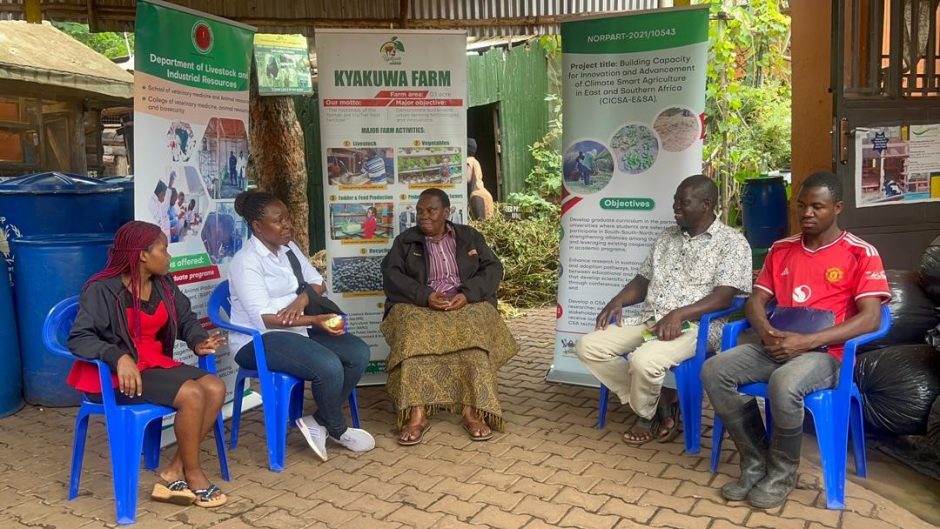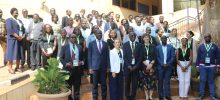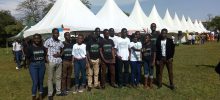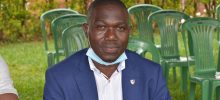Urban Farming & Climate-Smart Practices: Makerere Researchers Explore Innovations at Kyakuwa Farm
A team of scientists under the collaborative research project “Building Capacity for Innovation and Advancement of Climate Smart Agriculture in East and Southern Africa (CICSA-E&SA)” recently visited Kyakuwa Farm, a model site for urban farming innovations. The visit provided valuable insights into practical climate-smart farming technologies that can strengthen resilience and reduce emissions in urban and peri-urban livestock systems.
The Climate-Smart Agriculture project is led by Makerere University in partnership with the Norwegian University of Life Sciences (Norway), Maseno University (Kenya), LUANAR, and DARS (Malawi), with funding from the Norwegian Agency for International Cooperation and Quality Enhancement in Higher Education (Diku). One of its objectives is to develop a Climate-Smart Agriculture (CSA) Platform to bring together key stakeholders to share experiences, promote proven CSA technologies, and build farmer resilience while minimizing greenhouse gas emissions.
The visit was led by Principal Investigator Dr. Nampanzira Dorothy Kalule from the Department of Livestock and Industrial Resources at the College of Veterinary Medicine, Animal Resources, and Biosecurity (CoVAB), Makerere University. She was joined by other scientists, including Prof. Vincent Muwanika, whose combined expertise enriched the engagement at Kyakuwa Farm. Together, the delegation emphasized Makerere University’s dedication to promoting urban farming and climate-smart agriculture through collaborative learning and knowledge exchange.
While at the farm, the scientists witnessed a number of climate-smart innovations that reinforce the sustainability of the Kyakuwa dairy system. These included silage made from excess sweet potato vines, hay produced from Paspalum grass during compound slashing, and hydroponic fodder cultivated as a nutrient-rich supplement. To address the persistent challenge of flies, the farm applies diatomaceous earth, an organic insecticide, both in the environment and mixed with feed. This integrated approach, they learned, enhanced animal nutrition, improved herd health, and maintained environmental hygiene.

Dr. Dorothy Nampanzira (L), the Principal Investigator, interacts with Prof. Kabirizi at Kyakuwa Dairy farm
Prof. Jolly M. L. Kabirizi, Executive Director of Kyakuwa Farm and animal research scientist at Valley University of Science and Technology, welcomed the Makerere University team. She showcased her sustainable urban farming model, highlighting dairy production supported by innovative feed, waste management, and climate-smart practices that reduce costs, empower youth, and promote community engagement. The farm places dairy production at its core, integrating innovative feed and waste-management practices that embody climate-smart agriculture. These strategies enhance productivity, optimize resource utilization, and minimize environmental impact, making the farm a replicable model for sustainable urban farming.
According to the scientists, Prof. Kabirizi’s standout innovation is her concept of “turning waste into wealth.” Instead of relying mainly on elephant grass like many dairy farmers, she introduced the use of assorted organic market waste as a sustainable feed source. By training vendors in waste recovery, she incorporates bean pods, sweet potato vines, and pineapple residues into her feeding program. These unconventional resources now form a major part of her dairy system, cutting feed costs, improving sustainability, and reducing organic waste in urban markets.
Prof. Kabirizi complements her waste-to-feed innovations with sustainable feeding technologies that reinforce Kyakuwa Farm’s resilience. The farmer produces silage from surplus sweet potato vines, hay from Paspalum grass during compound slashing, and hydroponic fodder as a nutrient-rich supplement. To tackle the challenge of flies, Kabirizi said she applies diatomaceous earth organically in both the environment and feed. This integrated system boosts animal nutrition, strengthens herd health, and maintains environmental hygiene, showcasing climate-smart agriculture in action.

Some of the wastes are transformed into valuable energy sources at the farm
Kyakuwa Farm highlights a climate-smart use of manure by transforming it into a valuable energy resource. Through solar drying, manure is converted into charcoal briquettes that offer households a cleaner, affordable alternative to firewood. This innovation reduces reliance on traditional fuels, eases pressure on forests, and integrates renewable energy into livestock management, showcasing how circular resource use strengthens sustainability and climate resilience in urban farming.
In her closing remarks, after successful deliberations with the scientists, Prof. Kabirizi urged the visiting scientists to champion early retirement planning among farmers, drawing on her own rewarding retirement shaped by community training and mentorship. She has empowered households within and beyond Wakiso District through skills in urban dairy management, climate-smart feeding, and value addition.
Story by Harriet Musinguzi.







